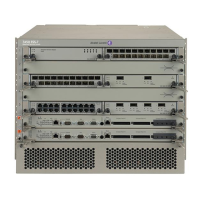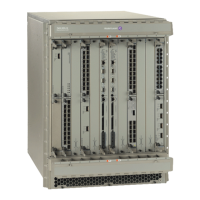IP Router Configuration
Router Configuration Guide 51
BFD Control Packet
The base BFD specification does not specify the encapsulation type to be used for sending
BFD control packets. Instead it is left to the implementers to use the appropriate
encapsulation type for the medium and network. The encapsulation for BFD over IPv4 and
IPv6 networks is specified in draft-ietf-bfd-v4v6-1hop-04.txt, BFD for IPv4 and IPv6 (Single
Hop). This specification requires that BFD control packets be sent over UDP with a
destination port number of 3784 and the source port number must be within the range 49152
to 65535.
In addition, the TTL of all transmitted BFD packets must have an IP TTL of 255. All BFD
packets received must have an IP TTL of 255 if authentication is not enabled. If
authentication is enabled, the IP TTL should be 255 but can still be processed if it is not
(assuming the packet passes the enabled authentication mechanism).
If multiple BFD sessions exist between two nodes, the BFD discriminator is used to de-
multiplex the BFD control packet to the appropriate BFD session.
Control Packet Format
The BFD control packet has 2 sections, a mandatory section and an optional authentication
section.
Figure 10: Mandatory Frame Format
al_0893
Version Diag Sta P F C A D R Detect Mult Length
0 1 2 3 4 5 6 7 8 9 0 1 2 3 4 5 6 7 8 9 0 1 2 3 4 5 6 7 8 9 0 1
01 2 3
My Discriminator
Your Discriminator
Desired Min TX Interval
Required Min RX Interval
Required Min Echo RX Interval
Table 4: BFD Control Packet Field Descriptions
Field Description
Vers The version number of the protocol. The initial protocol version is 0.
